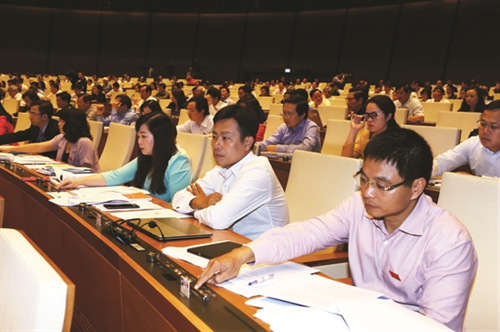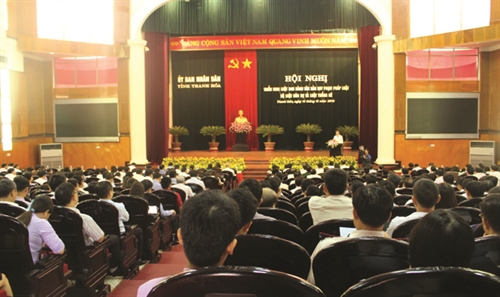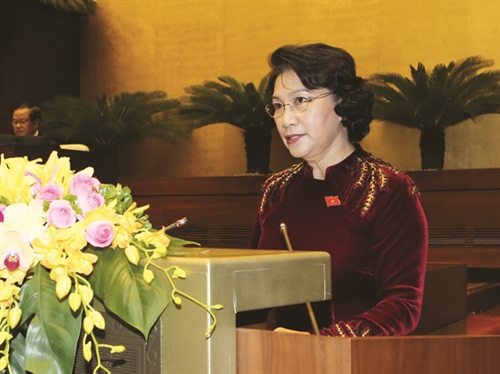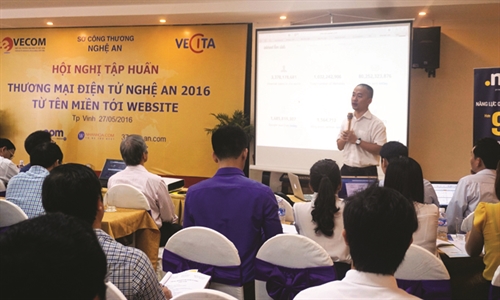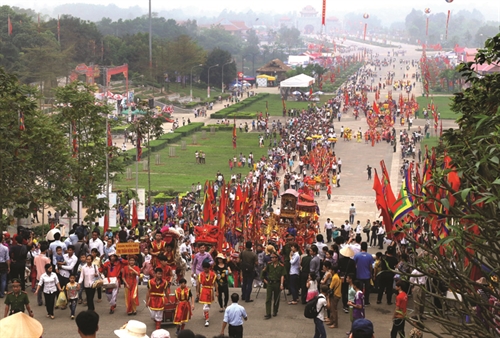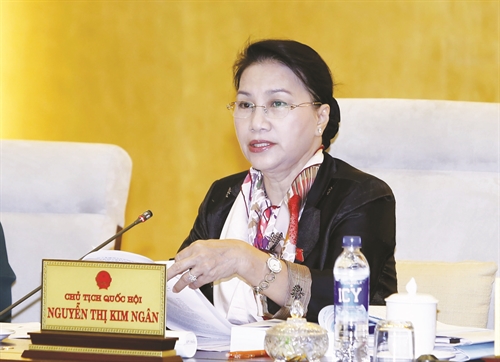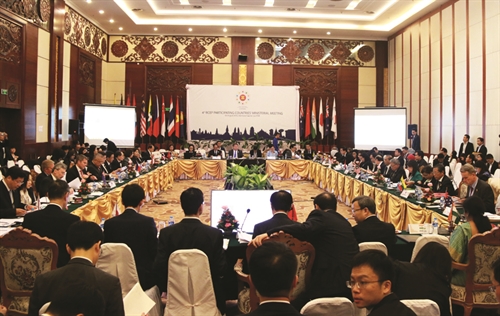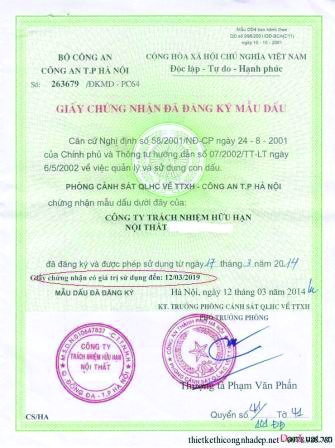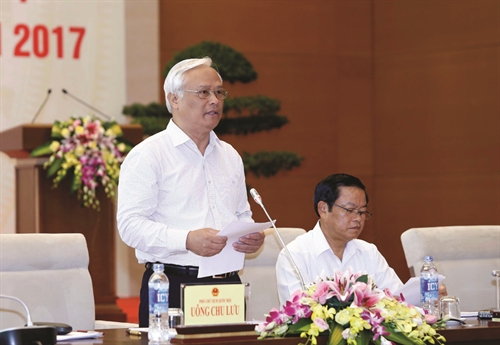The Communist Party of Vietnam Central Committee on October 30 issued Resolution No. 04-NQ-TW on enhancement of Party building and rectification, pointing to manifestations of degradation in political ideology, morality and lifestyle as well as “self-evolution” and “self-transformation” among Party members, and putting forth solutions.
The resolution points out to 27 manifestations, including nine of degradation in political ideology, nine of degradation in morality and lifestyle, and nine of “self-evolution” and “self-transformation” within the Party.
Manifestations of degradation in political ideology
l Neglecting the revolutionary ideal; fluctuating or reducing the confidence in the goal of national independence and socialism; doubting and lacking confidence in Marxism-Leninism and Ho Chi Minh Thought.
l Departing from the Party’s guiding principles and objectives; being non-persistent in the path toward socialism; chorusing misperceptions and wrong viewpoints.
l Misperceiving the significance and importance of political theory and study of political theory; being slothful to study Marxism-Leninism, Ho Chi Minh Thought, the Party’s policies, lines and resolutions, and the State’s policies and laws.
l Failing to strictly abide by the organizational principles of the Party; losing will to advance, failing to be exemplary in work; evading responsibility, showing irresponsibility or mediocrity, working perfunctorily and inefficiently; losing the sense of striving one’s best for the country and people, failing to accomplish the delegated responsibility and assigned tasks.
l In self-criticism, hiding and not daring to admit shortcomings; when having shortcomings, being not honest, not voluntary to accept discipline. In criticism, fearing to hurt others, being reluctant to conflict others, not defending the right and not daring to combat the wrong; abusing criticism to fawn on or to win sympathy of others or to slander, smear, criticize others with personal selfish motive.
l Speaking and writing in contravention of the Party’s viewpoints and lines, and the State’s policies and laws. Failing to match words with deeds; promising too much but doing too little; speaking one thing and doing the other; speaking one thing at a meeting but the other outside the meeting; being inconsistent in speaking and doing when being in office and after retirement.
l Showing wishful thinking, imposing, persisting in, only following one’s own opinion; declining to learn, listen to or accept reasonable ideas of others.
l Being power-hungry, declining to abide by assignment by organizations; selecting working titles and positions; selecting places with many benefits, opting to take easy tasks while abandoning difficult ones; being not willing to undertake tasks in remote areas, difficult localities. Even seeking every means to lobby, influence and gain election votes, votes of confidence for individuals in an unfair and unhealthy manner.
l Being burdened with the “office-term thinking”, only focusing on the settlement of short-term and immediate matters for one’s own benefits; availing oneself of the opportunity to appoint friends, acquaintances or relatives who are not fully qualified to leading and managerial positions or to arrange or post them to positions with many benefits.
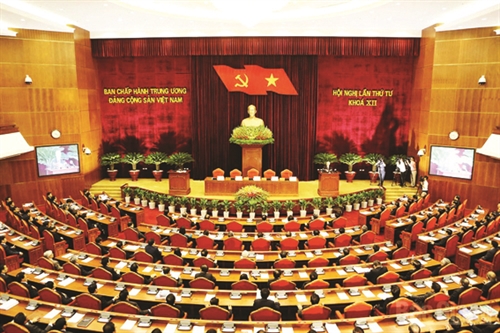 |
| Closing session of the 4th plenum of the Party Central Committee (XIIth Congress) _Photo: Tri Dung/VNA |
Manifestations of degradation in morality and lifestyle
l Showing individualism, egoism, pragmatism, opportunism, self-seeking; only looking after one’s own interests without showing concern for collective interests; showing envy to others, not wanting others to surpass.
l Breaching the principle of democratic centralism, causing internal disunity; adopting one-way unity and formalistic democracy; showing departmentalism, factionalism, envy for positions, fight over positions and powers; displaying despotism, paternalism, non-democracy in direction and administration work.
l Declaring one’s property and incomes untruthfully.
l Being infected with disease of “pursuit of achievements”, thirst for fame, showing off, hiding shortcomings while inflating accomplishments, “polishing” one’s name; liking to be praised; pay bribes for recognition of achievements, for commendations or titles.
l Being bureaucratic, detaching oneself from the masses, failing to keep close contact with grassroots level, ignoring inspections and supervisions, failing to firmly grasp the actual conditions of one’s own locality, agency or unit; showing indifference to and irresponsibility for difficulties, problems and legitimate demands of people.
l Making decisions or organizing the execution of decisions which cause waste, loss of finance, property, state budget, land, natural resources, etc; making unselective public investments with low or no efficiency; procuring, using public property in excess of set norms; spending public funds in an unprincipled manner; wasting labor and working time.
l Committing embezzlement, corruption, abusing positions and powers to collude with enterprises or other subjects for self-interests. Abusing, misusing assigned positions and delegated powers to tolerate, cover up or abet corruption or negative practices.
l Swaying personnel work; paying bribe for positions, powers, working places, personnel rotation, diplomas, non-prosecution. Using one’s delegated powers for the sake of personal interests or letting relatives or acquaintances abuse one’s position or power for self-interests.
l Gambling, drinking to plunge into dissipation, practicing superstition, supporting or joining in illegal religious organizations. Falling into social evils, breaching the fine customs, practices, cultural traditions of the nation, or family and social ethical standards.
Manifestations of “self-evolution” and “self-transformation” among Party members
l Opposing, negating Marxism-Leninism, Ho Chi Minh Thought and the organizational principles of the Party, particularly democratic centralism; demanding “pluralism”.
l Opposing, negating the socialist democracy, the law-ruled socialist state; demanding the “separation of powers”, development of “civil society”. Negating the socialist-oriented commodity economy, the regime of entire-people ownership of land.
l Speaking, writing or acting against the Party’s viewpoints, policies and lines and the State’s policies and laws. Lowering, negating the revolutionary gains; blowing up the shortcomings of the Party and the State. Distorting history, making fabrications or slanders against predecessor leaders and Party and State leaders.
l Inciting the ideas of discontent, difference of political opinions, internal opposition. Taking advantage of, and using the media and social networks to speak ill of, smear, lower the prestige and leading role of the Party, fomenting internal division, and causing doubts among Party officials and members and people.
l Negating the Party’s absolute, direct and comprehensive leadership over the armed forces; demanding “de-politicalization” of the army and public security forces; distorting the lines of all-people defense and people’s security; sowing division between the army and the public security forces; division between people and the army and public security force.
l Contacting, colluding with hostile and reactionary forces, opportunists, political malcontents to propagate opposite ideologies and viewpoints; mobilizing, organizing and rallying forces to oppose and undermine the Party and the State.
l Spreading false. distorted information about the foreign relation line and policies of the Party and the State; making one-sided, one-way reports on the international situation, causing disadvantages to the relations between Vietnam and other countries.
l Negating the Party’s role of leadership over the press, literature and arts. Influencing, dragging and driving social opinion not to follow the Party’s lines; encouraging extremist democratic views and ideologies; exaggerating the dark side of the society. Creating, propagating cultural, artistic works that are untruthful, distorting history, lowering the prestige of the Party.
l Adopting narrow-minded nationalist, extremist religious ideologies. Abusing “democracy”, “human rights”, national and religious issues to sow internal division, division among nationalities, religions, between the nation and religions, between nationalities, religions and the Party and State.
Solutions
The resolution puts forth various solutions classified into four groups.
The first group of solutions concerns ideological work, self-criticism and criticism, calling all Party committees and organizations to concentrate their leadership and direction on raising the awareness within the entire Party about the significance, role, importance and necessity of the study, research, creative application and development of Marxism-Leninism and Ho Chi Minh Thought.
To do this, they must work out annual compulsory theoretical study and training plans for Party officials and members incorporated with the provision of information and the updating of new knowledge suitable to each type of Party officials and members, their levels, sectors, and localities. All Party officials and members must seriously and efficiently study and follow Ho Chi Minh’s ideas, morality and style.
The resolution says all Party committees and organizations must actively struggle to defend the ideological foundations of the Party through stepping up practical reviews and theoretical studies, particularly of new models and good experiences and stimulating the development of theoretical thinking conformable with the renewal line of the Party. The contents, methods and forms of teaching and learning political theories should be combined with practical application.
Party committees and organizations must proactively grasp the ideological developments of Party officials and members so as to work out timely and effective policies and solutions, the resolution says.
In terms of morality, the Party will attach importance to establishing a system of standard relations between Party members and organizations as well as people. Annually, every Party leader, official and member will commit to temper themselves, preserve the moral qualities, and healthy lifestyles against degradation, “self-evolution”, “self- transformation”. Party Committees and organizations will check and oversee the materialization of these commitments of Party officials and members in their own localities, agencies or units.
The resolution sets the task of improving and seriously implementing the regulations on the model role-setting responsibility of Party officials and members, first of all members of the Political Bureau, Secretariat and Central Committee and secretaries of Party Committees at different levels.
It is necessary to devise regulations on self-criticism and criticism and improve the regulations on scientific and proper assessment of Party members and periodical and extraordinary collections of votes of confidence, according to the resolution.
The resolution calls for intensifying the management and reorganization of press, publishing, Internet, and social network activities. The press agencies and press-managing bodies should be actively involved in the struggle to prevent and combat degradation, red tape, corruption, waste, negative practices, “self-evolution”, “self-transformation”. Meanwhile, it is necessary to proactively provide information about Party’s policies and lines, the State’s policies and laws, the achievements in national construction and defense, positive elements, advance models, good people and good deeds.
Sharp theoretical arguments should be prepared for effectively refuting wrongful viewpoints and distorting tones of hostile and reactionary forces, opportunists and political malcontents.
The resolution says those individuals and groups of people who abuse “democracy”, “human rights”, religion and ethnicity for wrongful propaganda and distortion will be strictly punished. Forums and dialogues on matters on which there remain diverse perceptions and standpoints relating to the Party’s lines and policies and the State’s policies and laws will be organized.
Party Committees, administrations and leaders at all levels must tackle red tape and detachment from the people, attaching importance to training in scientific and specific and close-to-the grassroots working styles for leaders and managers at different levels.
Particularly, the resolution says promotion, rotation and transfer of officials must be based on their programs of action, work performance, materialization of their commitments to self-tempering, preservation of moral qualities and sound lifestyles; self-criticisms and criticisms; and efforts of struggling and overcoming degradation, “self-evolution”, “self-transformation”.
The second group of solutions relates to mechanisms and policies.
The resolution requires Party Committees and organizations at different levels to review, improve and strictly implement the mechanism of inspection, supervision and control of the exercise of powers by persons holding positions and powers. The spirit of this mechanism is that powers must match responsibilities; powers and responsibilities of collectives and individuals must be clearly defined for each stage of handling affairs, and violations must be severely handled.
The resolution clearly says that officials who work inefficiently, fail to accomplish assigned tasks, have poor capability and moral quality, and low prestige must be replaced or dismissed immediately without having to wait until they finish their office terms or retire.
Another solution is that Party Committees and organizations at different levels will direct the review and improvement of legal documents on management and administration to ensure publicity and transparency. This solution is intended at abolishing the “ask-give” mechanism and combating corruption, “group interests” and self-seeking acts in the management and use of state budget, public property, equitization of state enterprises, investment capital.
It is necessary to effectively restructure the apparatus and streamline personnel along with reforming the official-duty regime, restructuring the contingent of cadres, civil servants and public employees and renovating the salary regime.
Red tape, bumbledom, harassment for bribe, and negative acts committed by cadres and civil servants must be tackled, the resolution says.
It also reiterates the solution of separating public services and production and business management from the state management function of state management agencies with a view to raising the effectiveness and efficiency of these agencies’ activities.
Administrative reforms within the Party will be stepped up. Regulations will be revised to enhance management of Party officials and members and address irrationalities in personnel work with a view to ensuring the principle of equality and connectivity among agencies within the political system.
The third group of solutions relates to inspection and supervision work and enhancement of Party discipline.
The resolution says Party Committees and organizations at different levels will intensify inspections and supervisions and publicize their results. The Political Bureau, the Secretariat, and the standing boards of Party Committees at all levels will direct the prompt scrutiny of leaders and managers under their management. They must severely handle cases of degradation, “self-evolution”, “self-transformation” and those who fail to meet the appointment criteria, conditions and procedures, show poor abilities and low working efficiency, particularly relatives of key leading officials at different levels.
The resolution stresses the need to improve the operation of the Anti-Corruption Steering Committee and its standing board.
It points to the solution of increasing the power and responsibility of the inspection committees at all levels in the inspection, supervision and disciplining of Party organizations and members.
The regulations of the Party and State on disciplining should be reviewed and revised in order to ensure the consistency and compatibility between the disciplining systems of the Party and State, the resolution says.
Heads of bodies and organizations will be given more power to suspend from work officials under their management when these officials show signs of violation or poor performance of assigned duties and tasks. Heads of Party agencies and organizations must bear responsibility if they fail to promptly detect manifestations or delay the handling of detected manifestations of “self-evolution” or “self- transformation”.
Another solution is to bring into play the role of inspection, examination and investigation bodies as well as judicial agencies in order to raise the effectiveness of corruption and waste prevention and combat activities, and severely punish wrong-doing officials in accordance with law. In the immediately future, serious and complicated cases of corruption of great social concern will be thoroughly settled and their settlement results will be publicized, the resolution says.
Discipline within the Party will be tightened and violating Party officials and members must be promptly and accurately handled, ensuring the publicity, transparency and fairness, and those who are no longer qualified must be expelled from the Party, the resolution stresses.
The resolution requires the strict property and income declaration according to regulations and the development of a mechanism for explaining and overseeing increases and decreases in the properties of Party officials and members.
It says that agencies which propose the promotion and appointment of officials must appraise, verify and assess the truthfulness of these officials’ property and income declarations and publicize them according to regulations.
Finally, the resolution points to the crucial role of people, the Vietnam Fatherland Front and the press and public opinion in the struggle to ward off and repel degradation, “self- evolution” and “self-transformation” among Party officials and members.
It says that heads of Party Committees and administrations at all levels must hold periodical or extraordinary receptions of citizens in order to listen to their aspirations, reports and petitions, particularly those concerning the manifestations of degradation, “self-evolution” and “self-transformation” among Party officials and members.
A regulation on rating the people’s satisfaction with agencies, officials and civil servants directly handling affairs of citizens and enterprises will be worked out, with severe measures to handle those receiving low satisfaction ratings.
Mechanisms to protect and stimulate people to report on, denounce and actively prevent and combat degradation, “self-evolution” and “self- transformation” will be adopted, the resolution says.- (VLLF)
